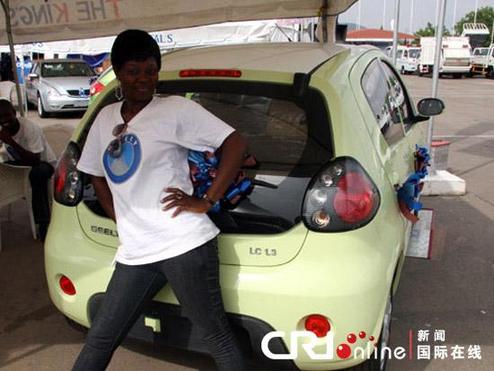Cars made in China popular in Africa

 0 Comment(s)
0 Comment(s) Print
Print E-mail CNTV, January 10, 2013
E-mail CNTV, January 10, 2013
With favorable prices and better quality, Chinese vehicles are becoming increasingly popular in Africa. The reputation of made-in-China cars is changing and improving.
When they were first introduced in Africa, Chinese cars faced an uphill challenge. Coming in at the lower end of the market, they were often purchased for their low prices but had a reputation for non-durability.
 |
|
With favorable prices and better quality, Chinese vehicles are becoming increasingly popular in Africa. |
Rafaat Masrouga, honorary chair of AMIC, said, "At the first introductory of Chinese cars , they didn't have validated specs information. So we at the Egyptian Automobile Information center, had to get the information through marketing intelligence, instead of the importer himself."
Devon Nassif, Geely in SA, said, "The perception is there that Chinese products aren't of great quality, they think of something cheap and think it's of cheap quality. Every household appliance is made in China! Even your iphone is made in China, so it's about changing that perception."
Fast forward a number of years and that perception has changed. Chinese cars have become the fastest growing category in most African markets.
Devon said, "We've already got over 3,000 units on the road in South Africa. And we're looking at sales of 200 - 250 units a month."
And it is not just for their price, Chinese vehicles are now competing at the same level in terms of quality as other better known brands.
Rafaat said, "Consumer perception changed towards the Chinese products, the Egyptian importer started demanding vehicles with specific standards. This made a big change for the Egyptian consumer, Prices is no longer the only factor for purchasing a Chinese car it is one of the factors of evaluation, now quality is in the equation, after it became better."
Wang Xiaochun, Deputy General MGR of NORINCO Motors, said, "So far we have succesfully sold more than 3,000 cars in Southern Africa, in market share we have left most brands, Japanese behind us, we are closely behind most American and European brands like scania, mercedes."
Some experts believe that it is only a matter of time before such luxury cars become household names in most of Africa.
John Bentley, Accelerate magazine, said, "The new ones are a lot better, they are cheap cars but they've got a bit of flair to them which does make them interesting. I think it's early days. I don't know the exact figures but I'd guess it's around 300 a month or whatever. There are companies doing a lot less than that and they're still staying here."
And its not just the Chinese brands that are growing, but employment opportunities too.
Wang said, "We have employed more than 100 employees, local, if we include dealers they can reach 500, we emphasize environement protection and appreciate and local culture. We strongly believe in the management philosophy that local people can make your business grow very rapidly."
With a growing reputation for quality, Chinese cars might just be the right match for consumers looking for something different, and soon, made in China could be a common fixture in many a car market.
This story, of car makers, roughly defined by nationality, trying to crack into foreign markets, has played out before. In the 1970s, Japanese car makers were still sorting out concerns over quality. In the 1990s, it was the Koreans' turn. Today, it's China's.
In 2011, this one country produced some 18.4 million vehicles, a million more than the EU's 27 states combined. If this story plays out for Chinese car makers, as it did for those in Japan and Korea, drivers around the world are in for an interesting time.






Go to Forum >>0 Comment(s)